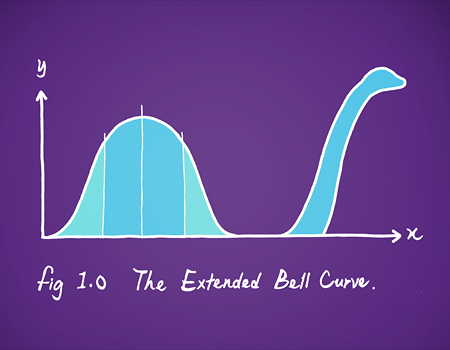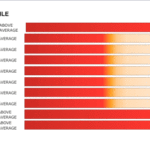Transform your career by shifting: Shift 9: From Normative Thinking To Normative And Scalable Thinking
When I was a child, I didn’t want to be with the other young kids in the shallow end of the pool, but I was also secretly too scared to want to be at the deep end where the cool kids hung out and dived in. So I settled for the middle of the pool, and I wasn’t the only one. In fact, that is where most of the kids were – in the middle, with some at the shallow end and some at the deep end. It was normal to see the kids spread across the pool like this.
You see a similar pattern at the beach, some kids close to the shore, some way out beyond the breakers and most somewhere in the middle. In fact quite a few things in life seem to be arranged in this way: a few at each extreme, with lots in the middle. Think of weight, height, the length people wear their hair, length of movies, and political views.
Indeed it is tempting to think that all human behaviour and qualities conforms to this pattern, which of course is otherwise known as the normal curve, or the bell-shaped curve. The trouble is that life is not always like that.
Thinking that things conform to a normal curve – normative thinking – can be quite misleading. One of the most common fallacies is to under-estimate the potential that outlier events have in transforming our world. In a normative way of thinking, outliers are exceedingly rare events, and because of this, it is “safe” to act as though they really do not exist. However such a view completely misconstrues the nature of things.
Nassim Taleb makes this point in his book Black Swans, by contrasting two imaginery worlds, Extremistan and Mediocristan. Mediocristan is world that contains things that conform to the normative rules, where things change only in small increments.
Height is a good example of a mediocristan quality. Imagine you had 99 people whose mean average height was 165cm. Then imagine that Robert Wadlow, the world’s tallest ever living person wandered in. Adding his 272cm height to the average, we find the average goes up to a whopping (wait for it), 166cm. In other words, a once in human history event leads to a change in our height less pronounced that putting on a pair of Jimmy Choo’s or a pair of Dock Marten’s.
In Extremistan, things are different. In this world, things are scaleable. This means that when change occurs it can be changes in the order of magnitude, change that changes everything. Now imagine our 165cm 99 people had an average wealth of $500,000. Now suppose instead of Wadlow, Warren Buffet walks into the room and in a philanthropic gesture offers to share his 62 billion dollar wealth equally with the others. The average wealth in the room increases to: $620 million or enough for 413,000 pairs of Jimmy Choo’s (enough to shoe the entire population of the Assabet Sudbury & Concord rivers district of New England) or 3.12 million pairs of Docs. In other words you could be a Rude Boy with a new pair of Docs every day of your life (assuming you lived to be 8500) or alternatively you and your life partner could have matching Docs every day of your life and still had enough to shod every man, woman and child in Madrid) . That ladies and gentlemen of the jury is life changing.
Slipping into my comfortable, yet challenging and exciting career development slippers, the implications for career development planning are that careers too are subject to change that can change everything. One management decision, one idea, one meeting, one workplace accident can change ones world in unimaginable ways – be it positive or negative.
Some scaleable events that occur in careers include:
- the closure of a complete industry due to economic, legal or political factors
- the impact of a war or terrorism
- a chance meeting leading to a new career path
- a conversion or enlightenment moment leading to a new path
- the acceptance of a new philosophy or faith or world view
- an exposure to a life experience that is transforming
- an accident
- an inheritance or lottery win
- the invention of a new technology
- the opening (or closure) of a new or old business nearby
- a mistake or failure that exposed you to new unanticipated experiences
- and on and on
If we think and encourage our clients to think in normative terms, then we will be encouraging them to think that the present is as it always will be, and any change will be small, incremental and largely controllable and predictable. In other words we will be encouraging them to either be overly optimistic about their ability to predict and control their circumstances, or overly pessimistic about their ability to radically change their situation.
Recognising that Extremistan not only exists, but may account for most of the important moments in the history of mankind (Taleb), means to alter our approach to career counselling. It means helping clients to understand these realities and to see the potential for reinvention within them. It also means helping them to understand that risk management strategies, like career plans can be sometimes be overwhelmed by change on a scale that was unthinkable.
It might seem easy to write about this idea having witnessed the madness that are the current global markets, but it is worth remembering that when Taleb started writing about these notions, the GFC was not upon us, and some commentators (like Standard and Poors) were predicting stock market growth in 2008.
Some things in life are normative – they are generally the rather boring and unimaginative things. Whereas other events in life are scalable – their presence is sufficient to change everything. Those break-through moments in counselling are not merely the slow movement toward to a new outlook, they tend to come suddenly and unexpextedly – like an “aha” moment, when things combine, a new possibility emerges, a new insight or direction becomes clear.
It is our job to help clients see the difference between normative and scaleable thinking, and when a scaleable event occurs, we want our clients to be ready with their bags packed, and a fresh pair of Jimmy Choos or Docs on their feet, ready to travel whatever pathway emerges from these sudden transformations.
Shiftwork is the work we have to do to manage, thrive and survive in a world where shift happens. I’ve identified 11 shifts that we have to make (see here), so far I’ve addressed the first eight, and in this post, I addressed the ninth shift. The earlier ones you can read by following these links:
- first shift Prediction To Prediction And Pattern Making (see here)
- second shift From Plans To Plans And Planning (see here)
- third one From Narrowing Down To Being Focused On Openness (here)
- fourth shift From Control To Controlled Flexibility (see here)
- fifth shift From Risk As Failure To Risk As Endeavour (see here)
- sixth shift From Probabilities To Probable Possibilities (see here)
- seventh shift from Goals, Roles & Routines to Meaning, Mattering and Black Swans (see here)
- eighth shift from Informing to Informing and Transforming (see here)
Related Posts










Pingback: Transform your career by shifting: Shift 11 - From Trust As Control To Trust As Faith | The Factory